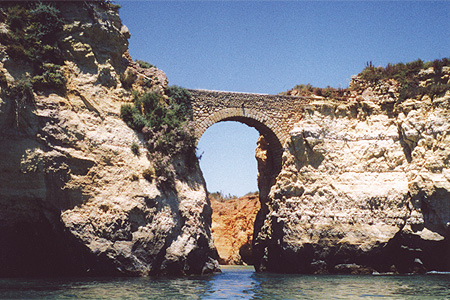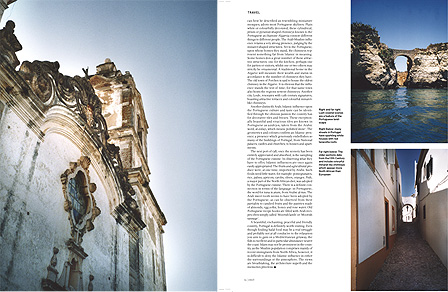
The Poetry of Portugal
Issue 6 Jun / Jul 2004
First Published on July/August 2004
To access the issue page, click here
Words Zarina Saley
Photography Sarah Allen
You could be fooled into thinking that the European Football Championships are the only significant event to place Portugal on the map. However as Zarina Saley discovers, there is a great deal more to this Mediterranean country than meets the eye. Although there isn’t an overt sense of Islamic presence and heritage in Portugal, the visible sign of an Arab influence that has been woven into the general tapestry of the country is unquestionable.
Inhabitants and visitors may not be aware that Portugal was, at one time, part of al-Andalus: the land known in the West as Moorish Spain. The hint of tastes, designs and aromas are, not only, easy on the eye and pleasant on the palate, but largely distinguished as authentically Portuguese. The Islamic invasion of Iberia at the beginning ofthe eighth century, followed by the five centuries of Arab rule set a brand new precedent forthe wealth of such cities as Cordoba. The Arab domination may have ended when Alfonso III conquered Faro mid-13th century, but the importance of Islamic influences upon the sciences, architecture, foods and delicacies;on certain words and music, are ever-present.In 711, the Iberian Peninsula came under Arab rule. This was soon after the first Arab probe across the Strait of Gibraltar. Iberia,which consisted of Galicians, Castilians, Catalonians, divided into what is now recognised as being the respective nations of Spain and Portugal, in around 1139. The Arabs, over their 250 years of occupation, were pushed further and further south until their ultimate defeat at Faro. Just as the Atlantic ocean wears away the rocky cliff face of the western coast,corroding and leaving its indelible mark on the appearance of the country, so too did the Arabs leave their imprint upon the overall culture of Portugal.

The Muslim army was led by Tariq ibn Ziyad. The campaign took five years, and entailed defeating the ruling Visigothics.The Visigothic peasants converted to Islam readily, since they had only been superficially Christianised. Having settled in the Algarve, a climate and terrain familiar to Arabs, the legacy of a thriving agricultural history for Portugal thus began. The common Portuguese verb, mourejar, which means 'to work like a Moor' and implies unusual diligence and tenacity was adopted as a result of the inherited work ethics and techniques ofthe Muslims. Irrigation systems, watermills and windmills were implemented; all tried and tested constructions inherited from North Africa. The Portuguese word azenha fromArabic al-saniyah, connoting the wind/watermill and the word nora from Arabic na’urah for water wheel, display an obvious connection between Portugal and North Africa.Cordoba was the intellectual capitalof Spain; its counterpart in Portugal was Silves. Both cities remained unparalleled in Renaissance Europe. The atmosphere at the time of Muslim domination in Silves was one of peaceful cohabitation, in terms of wealth, learning, innovation and culture. It became an intellectual hotspot under Arab rule. The introduction of schools and libraries saw an influx in the exploration of the sciences, especially mathematics. Local architecture becameincreasingly dictated by the infiltrating and appealing arabesque designs.
The Portuguese landscape resembles something like a North African scene. Whitewashed walls and terracotta tiles embellish every town and village. Windmills and watermills symbolise the agricultural link between the North African and Portuguese cultures, whilst minaret-shaped chimneys that can best be described as resembling miniature mosques, adorn most Portuguese skylines. Plain white or colourfully decorated, these cylindrical, prism or pyramid-shaped chimneys known to the Portuguese as chamine Algarvia connote different things to different people. The Arab-Muslim influence retains a very strong presence, judging by the minaret-shaped structures. Yet to the Portuguese, upon whose homes they stand, the chimneys represent something far from Islamic in meaning. Some homes don a great number of these attractive structures: one for the kitchen, perhaps one for parties or visitors, whilst one or two others may strictly be ornamental. A traditional home in the Algarve will measure their wealth and status in accordance to the number of chimneys they have. The old town of Porches is said to house the oldest chimney in the Algarve. It is obvious that the influence stands the test of time, for that same town also hosts the regions newest chimneys. Another city, Loule, resonates with 12th century signatures, boasting attractive terraces and colourful minaret like chimneys.
Another distinctly Arab, Islamic influence upon the Portuguese culture and taste can be identified through the obvious passion the country has for decorative tiles and friezes. These exceptionally beautiful and vivacious tiles are known in Portuguese as azulejos, taken from the Arabic word, al-zulayi, which means 'polished stone'. The geometrics and colours confirm an Islamic presence; a presence which generously embellishes so many of the buildings of Portugal, from National palaces, castles and churches, to houses and apartments.
The next port of call, once the scenery has been entirely appreciated and absorbed, is the sampling of the Portuguese cuisine. In observing what they have to offer, Islamic influences are once again easily appropriated. The fruits and agricultural produce were, at one time, imported by Arabs. Such foods need little water, for example: pomegranates, rice, palms, apricots, carobs, olives, oranges. Fish, a major part of the North African diet, was adopted by the Portuguese cuisine. There is a definite connection in terms of the language: in Portuguese, the word for tuna is atum, from Arabic al-tun. The Arab sweet tooth seems to have been adopted by the Portuguese, as can be observed from their partiality to candied fruits and the pastries made of almonds, egg yolks, honey and rose water. Old Portuguese recipe books are filled with Arab recipes often simply called 'Moorish lamb' or 'Moorish sausage'.
A beautiful, enchanting, peaceful and friendly country, Portugal is definitely worth visiting. Even though finding halal food may be a real struggle and probably not at all conducive to the relaxation you aim to gain on a Mediterranean getaway, the fish is excellent and in particular abundance nearer the coast. Islam may not be prominent in the country, as the Muslim population comprises mainly of recent immigrants from North Africa, however, it is difficult to deny the Islamic influence in either the surroundings or the atmosphere. The views are breathtaking, the architecture superb and the memories priceless.
Bookmark this |
|
Add to DIGG |
|
Add to del.icio.us |
|
Stumble this |
|
Share on Facebook |
|
Share this |
|
Send to a Friend |
|
Link to this |
|
Printer Friendly |
|
Print in plain text |
|


Comments
0 Comments